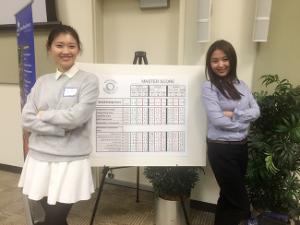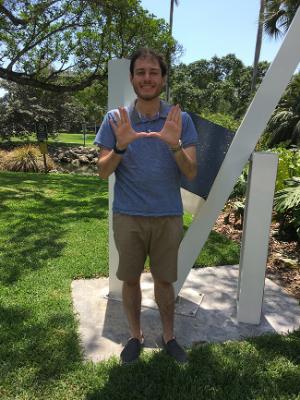|
|
| UM grad students Zhizhou Wang and Qian Huang |
The Network of Schools of Public Policy, Affairs, and Administration (NASPAA) Second Annual Student Simulation Competition on Global Climate Change hosted over 300 graduate students from around the world who collaborated to solve the issues related to global warming and climate change.
Out of the many graduate students in the MPA program, Huang, Wang, and Sands were nominated by the faculty and selected by MPA Program Director and Political Science Department Chair Dr. Jonathan West to represent UM. Political Science Professor Dr. Rayna L. Stoycheva also attended the competition.
“If we can do the sort of things we did in Atlanta, our forecast won’t be as dire,” said Sands. “It was very much a compromise solution that didn't get us to where the scientists think is the best route in the future, but at least it's a starting point.”
During the simulation, 60 students were divided into three groups of 20, each tackling the issues from different perspectives. Each group had small teams of three or four students, who represented an interest group or stakeholder in climate change; Wang’s team represented the coal industry.
Despite the fact that all the students in the conference were placed in different groups, they were all committed and worked together to achieve their goal. “It's a group exercise. You need to talk with everyone, learn about their interests, and see what is the bad thing you can do and what is the great profit for all of us,” said Wang.
|
|
| Kevin Sands, MPA program grad student |
Utilizing a simulator, which analyzed projections from now until the year 2100, the various groups tried to meet their temperature obligations. After three rounds, their projections and results were presented to a panel of three judges. Wang’s team won “Best Sector of the Group” and “Best Name Title” – cleverly titled, “Emission Impossible.” Among the eight finalist teams, Huang’s team won “Best Climate Change Simulation Team,” and was also selected as the semi-finalist team and runner-up.
“The local winning team, and runner-up in the global competition, created a comprehensive policy solution that by the year 2100 limits global warming to 2.0 degrees Celsius to protect the Earth from its catastrophic impacts,” said Dr. Stoycheva.
During President Julio Frenk’s inauguration earlier this year, he outlined many goals for UM, including expanding research on the threat of climate change and sea level rise, an issue very prevalent in South Florida.
“It certainly shows where our priorities are, as it should be,” said Sands. “It reaffirms the school’s commitment to climate change research and fighting climate change.”
April 19, 2016



